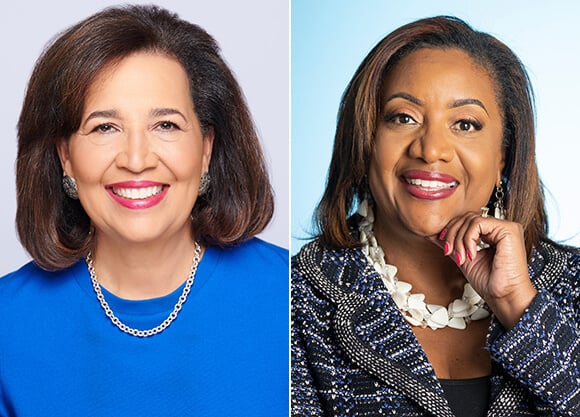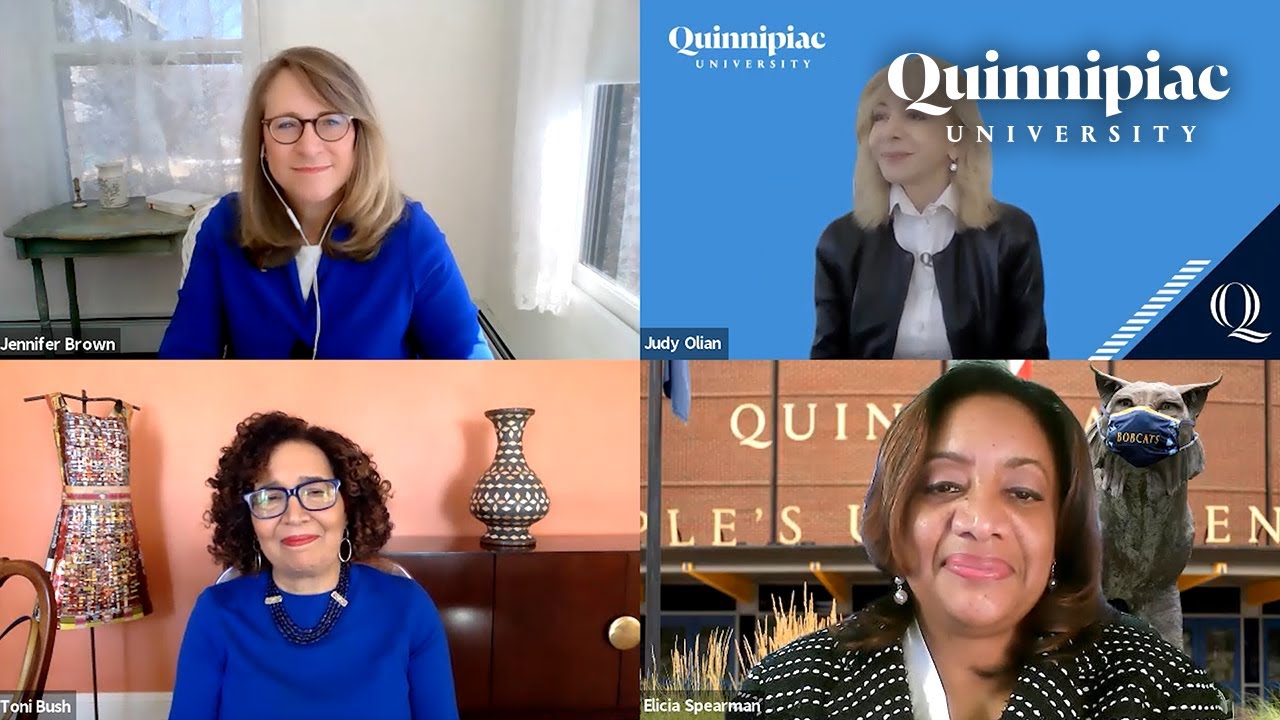
Successful leaders stress open-minded, eclectic mindset as keys to success
March 01, 2021

March 01, 2021

Elicia Pegues Spearman, Quinnipiac’s general counsel and vice president for human resources, began to consider law as a career when she decided to follow several of her college friends to law school.
Both women have enjoyed diverse and distinguished careers that have seen them rise to the top of big law firms, corporate America, federal agencies and higher education. They shared their unique trajectories, perspectives as women of color in the fields of law and government, and the flexibility of a legal education during a webinar on Feb. 25 titled, “Navigating Your Career Path Across the Private and Public Sectors.”
This latest installment in Quinnipiac President Judy Olian’s The Way Forward speaker series was moderated by Olian and Jennifer Gerarda Brown, dean of the School of Law. Brown described both Bush and Spearman as having embarked on “indirect but purposeful career paths in which their legal training prepared them for varied and expansive roles.”
“A lot of my career was focused on how the law and policy would evolve as we had new technologies,” said Bush. She began at Kirkland & Ellis, a large, D.C.-based law firm. Over the years, she has served as senior counsel to the communications subcommittee of the U.S. Senate Committee on Commerce, and executive vice president of Northpoint Technology Ltd.
“Working in and out of government gave me the perspectives of those in private enterprise, as well as regulators and lawmakers,” Bush said.
Prior to Quinnipiac, Spearman was vice president and chief human resources officer at General Dynamics Electric Boat in Groton. She also has practiced law in the District of Columbia and worked for the Children’s National Medical Center and the Federal Bureau of Investigation, among other places.
Like Bush, Spearman chose an open-minded and eclectic approach to career development that enabled her to become “industry agnostic.” “Go where there are jobs, and find out what you like and what you don’t like,” she said.
Olian concurred, saying that modern careers follow an “inverted pyramid” model. She urged listeners to consider lateral career movement the same as upward movement.
“It is, in fact, an expansion of your career,” she said.
Olian called both Bush and Spearman inspiring role models for finding success despite persistent gender bias, which has historically slowed the career mobility of women —especially those of color — in the field of law.
Bush knows this discrepancy well. When she began her career at Kirkland & Ellis, she was the only black, female lawyer on a roster of 90 lawyers. Years later, she was the only black, female partner at the firm of Skadden, Arps, Slate, Meagher & Flom LLP.
“I viewed it as an opportunity to mentor women and diverse lawyers, but also to try and impact hiring decisions and the hiring process,” she said.
Bush views the ability to work from home — normalized during the COVID-19 pandemic — as an equalizer that will enable women to reconcile career aspirations and professional responsibilities with family obligations.
Spearman agreed, saying she was heartened by the recent promotions of several female colleagues to managing partner positions at their respective law firms. She also rejects the notion that their success, or that of others like them, was the result of an “easy quota system brought about by the nation’s racial reckoning.”
“You’re not going to get a position in this field — especially if you’re an African American woman — unless you are qualified,” Spearman said.
Both Bush and Spearman suggested that men and women of color do the following: find mentors, especially those in leadership positions, at companies and law firms; allow their job performance to quell any stereotyping they may encounter; and be visible.
“I can’t emphasize enough just being confident and going after things,” Bush said. “Once you get into the working world, you have to actually ask for what you want.”

Quinnipiac Today is your source for what's happening throughout #BobcatNation. Sign up for our weekly email newsletter to be among the first to know about news, events and members of our Bobcat family who are making a positive difference in our world.
Sign Up Now